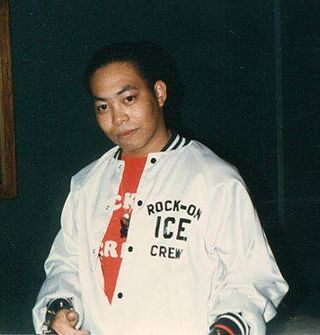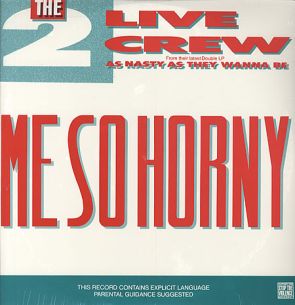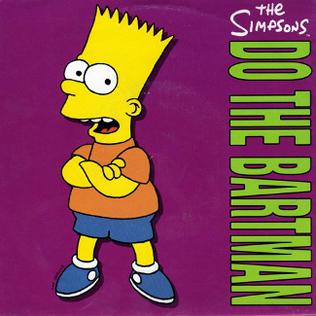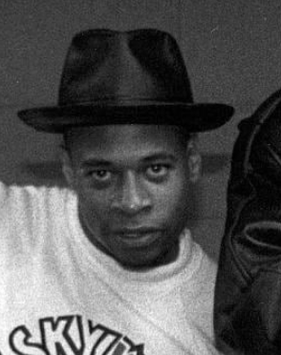
Bartholomew Jojo "Bart" Simpson is a fictional character in the American animated television series The Simpsons and part of the Simpson family. He is voiced by Nancy Cartwright and first appeared on television in The Tracey Ullman Show short "Good Night" on April 19, 1987. Cartoonist Matt Groening created and designed Bart while waiting in the lobby of James L. Brooks' office. Groening had been called to pitch a series of shorts based on his comic strip, Life in Hell, but instead decided to create a new set of characters. While the rest of the characters were named after Groening's family members, Bart's name is an anagram of the word brat. After appearing on The Tracey Ullman Show for two years, the Simpson family received its own series on Fox, which debuted December 17, 1989. Bart has appeared in every Simpsons episode except "Four Great Women and a Manicure".

Luther Roderick Campbell, also known as Luke Skyywalker, Uncle Luke and simply Luke, is an American rapper, promoter, record executive, actor, and former leader of the rap group 2 Live Crew. He is known for having helped create the Miami bass genre, for establishing one of the first rap groups and rap labels in Southern hip hop, and his sexually crude call and response lyrics which were unique for the time period. He also starred in a short-lived show on VH1, Luke's Parental Advisory.

Banned in the U.S.A. is the fourth album by the 2 Live Crew. It was originally credited as Luke's solo album. The album included the hits "Do the Bart" and the title track. It was also the very first release to bear the RIAA-standard Parental Advisory warning sticker.

The Simpsons Sing the Blues is the first album released as an offshoot of The Simpsons. The album contains originally recorded music not featured in the series save for the first verse of the track "Moaning Lisa Blues" which was first featured in the episode "Moaning Lisa", which aired in the United States on February 11, 1990. The album was released on December 4, 1990, and peaked at No. 3 on the Billboard 200.

"Homer's Phobia" is the fifteenth episode of the eighth season of the American animated television series The Simpsons. It first aired on the Fox network in the United States on February 16, 1997. In the episode, Homer dissociates himself from new family friend John after discovering that John is gay. Homer particularly fears that his son Bart will become gay if Bart spends time with John, so Homer decides to do hypermasculine activities with Bart, believing the activities will ensure Bart turns out to be heterosexual.

Christopher Wong Won, better known by his stage name Fresh Kid Ice, was a Trinidadian-American rapper and a Miami bass pioneer. Wong Won was born and spent his early childhood in Port of Spain, Trinidad and Tobago, before emigrating to the United States. In his early twenties, Wong Won was in the United States Air Force and he co-founded 2 Live Crew while he was stationed in California. Early 2 Live Crew singles gained so much traction in Florida that they relocated there. By 1986, the group released the single "Throw The 'D'"; it is now considered the blueprint of Miami bass.
"Behind the Laughter" is the twenty-second and final episode of the eleventh season of the American animated television series The Simpsons. It first aired on the Fox network in the United States on May 21, 2000. In the episode, a parody of the VH1 series Behind the Music, the Simpsons are portrayed as actors on a sitcom, and their dramatic inner turmoil and struggles are detailed. Told in a mockumentary format, the episode presents a fictional version of how The Simpsons began.

"Me So Horny" is a song by the rap group 2 Live Crew on their album As Nasty as They Wanna Be. The explicit nature of the lyrics of this song and the album led to the initially successful prosecution of the group on obscenity charges and the album being banned from sale in Florida. This ban was overturned on appeal.
"Radio Bart" is the thirteenth episode of the third season of the American animated television series The Simpsons. It originally aired on the Fox network in the United States on January 9, 1992. In the episode, Bart receives a microphone that transmits sound to nearby AM radios. To play a prank on the citizens of Springfield, he lowers a radio down a well and uses the microphone to trick the town into thinking a little boy is trapped there. The prank succeeds, but Bart remembers labelling the radio with his name, tries to retrieve it, and becomes trapped himself. Angry at being duped by Bart, the townspeople refuse to rescue him.
"All Singing, All Dancing" is the eleventh episode of the ninth season of the American animated television series The Simpsons. It originally aired on the Fox network in the United States on January 4, 1998. In the fourth Simpsons clip show, Homer claims he hates singing, so Marge shows family videos of musical numbers from previous seasons. The episode is in the form of a sung-through musical, featuring spoken dialogue only at the start and end of the episode. The original material was directed by Mark Ervin and written by Steve O'Donnell. It was executive produced by David Mirkin. It features guest appearances from George Harrison, Patrick Stewart and Phil Hartman, although these are all clips and none of them recorded original material for the episode.

"Do the Bartman" is a song from the 1990 album The Simpsons Sing the Blues, featuring the voice cast of the American animated television series The Simpsons. It was performed by The Simpsons cast member Nancy Cartwright, with backing vocals from American singer Michael Jackson, alongside additional vocals from Dan Castellaneta. Jackson also produced the song, which was written by American recording artist Bryan Loren, and Geffen Records released it as a single on November 20, 1990.

"Deep, Deep Trouble" is a rap song from the 1990 Simpsons album The Simpsons Sing the Blues, performed by the fictional character Bart Simpson about his trouble-making antics. It was written by Matt Groening and DJ Jazzy Jeff and recorded in September 1990.
Dirty rap is a subgenre of hip hop music that contains lyrical content revolving mainly around sexually explicit subjects.

"The Gold Diggers' Song " is a song from the 1933 Warner Bros. film Gold Diggers of 1933, sung in the opening sequence by Ginger Rogers and chorus. The entire song is never performed in the 1933 movie, though it introduces the film in the opening scene. Later in the movie, the tune is heard off stage in rehearsal as the director continues a discussion on camera about other matters.
David P. Hobbs, also known by his stage name Mr. Mixx, is an American musician and record producer who is the co-founder of the controversial rap group 2 Live Crew. In 1986, the group released the single "Throw The 'D'"; it is now considered the blueprint of Miami bass.

The Luke LP, or Banned in the U.S.A.: The Luke LP is an alternate version of 2 Live Crew's Banned in the U.S.A. and was marketed as Luther Campbell's debut album, though there were only minor changes to the track listing, notably, remixes to "Banned in the U.S.A." and "Mama Juanita". It managed to make it to No. 21 on the Billboard 200 and No. 10 on the Top R&B/Hip-Hop Albums chart.

The Simpsons is an American animated comedy franchise whose eponymous family consists of Homer, Marge, Bart, Lisa, and Maggie. The Simpsons were created by cartoonist Matt Groening for a series of animated shorts that debuted on The Tracey Ullman Show on Fox on April 19, 1987. After a three-season run, the sketch was developed into The Simpsons, a half-hour prime time show that was an early hit for Fox, becoming the first Fox series to land in the Top 30 ratings in a season (1989–1990). The popularity of The Simpsons has made it a billion-dollar merchandising and media franchise. Alongside the television series, the characters of the show have been featured in a variety of media, including books, comic books, a magazine, musical releases, and video games.

Mark D. Ross, better known by his stage name Brother Marquis, was an American rapper and a Miami bass pioneer. Ross was born in Rochester, New York, in his teens, and with his mother, they moved to Los Angeles, California. By the early 1980s, Ross started to release music with his group The Cautious Crew, and shortly after he made an impression with DJ and producer David Hobbs due to his battle rap abilities. At the time, Hobbs was part of a group named 2 Live Crew, who had just created the Miami Bass blueprint, and were successful in Florida. Eventually a member of the group left, and Ross accepted an invitation to replace him. Due to his comedic sensibilities, Ross integrated easily into the direction the group was taking. Alongside Hobbs, Christopher Wong Won, and Luther Campbell, they became the most well-known line up of the group. In 1986, they had a breakthrough with their Gold-certified debut album, The 2 Live Crew Is What We Are.

The 2 Live Crew is an American hip hop group from Miami, Florida, which had its greatest commercial success from the late 1980s to the early 1990s. The group's most well-known line up was composed of Luke, Fresh Kid Ice, Mr. Mixx, and Brother Marquis. They were considerably controversial in the U.S. due to the sexually explicit content in their songs, particularly on their 1989 album As Nasty as They Wanna Be.














